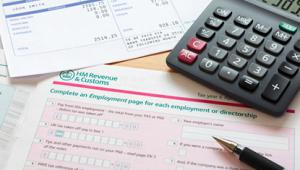Finance secretary Derek Mackay faced questions in the Scottish Parliament over the ability of HM Revenue & Customs to determine who should be paying income tax in Scotland. This follows an overhaul of Scottish income tax that has seen the introduction of two new bands at the bottom of the system and an increase in the rates to be paid by those at the top.
Bruce Crawford, convener of Holyrood’s finance and constitution committee, said he was aware of “at least two MSPs” who had been told by HMRC that they had not lived in Scotland for the majority of the tax year, apparently because their address had been given as Great Britain instead of Scotland.
He was concerned that the same issue could potentially apply to a “significant number of people” across Scotland.
“How confident are you about HMRC’s ability to identify properly Scottish taxpayers on that basis and what impact might that have on your Scottish budget if this was proved to be a more significant problem than just two of our MSP colleagues?” he asked.
Mackay said he expected HMRC to provide robust systems for the identification of Scottish taxpayers, and that these cases would be investigated.
“All MSPs will be resident in Scotland and all should be paying the Scottish rate of tax, so further probing of those cases would be helpful,” he said.
“HMRC has given my civil servants the reassurance that they have programmes in place to properly identify everyone who should be paying tax for our purposes.”
“We want to ensure that every taxpayer that should be paying tax in Scotland is paying tax in Scotland, so it comes to us for investment in public services.
He had no reason to believe it was a “substantial problem”. “But that’s all the more reason to probe it based on any cases that can be raised where somebody hasn’t been identified,” he said.
Andrew Chapman, team leader for fiscal delivery and constitutional change in the Scottish Government, said a joint project board with HMRC met quarterly to discuss these issues on top of “almost daily” contact between the two bodies.
“Part of the work of that board is to ensure there are rigorous data checks in place with regards to the identification and ongoing maintenance of the system to identify Scottish income tax payers,” he said.
Questioned by Green MSP Patrick Harvie over the extent to which the new income tax arrangements would lead to behavioural change, Mackay said the Scottish Government was doing its own analysis to provide “constructive challenge” to the forecasts provided by the Scottish Fiscal Commission.
The commission has suggested that any growth in tax revenue under the new system would be wiped out by the highest earners taking action to reduce their liabilities.
Mackay said outturn data from HMRC would be closely examined to determine the impact of the tax changes.
“That will be able to tell us much more on what actually happened in behavioural change as opposed to what people think might happen,” he said.











